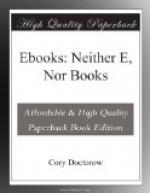Back to democratic-ness. Every successful new medium has traded off its artifact-ness — the degree to which it was populated by bespoke hunks of atoms, cleverly nailed together by master craftspeople — for ease of reproduction. Piano rolls weren’t as expressive as good piano players, but they scaled better — as did radio broadcasts, pulp magazines, and MP3s. Liner notes, hand illumination and leather bindings are nice, but they pale in comparison to the ability of an individual to actually get a copy of her own.
Which isn’t to say that old media die. Artists still hand-illuminate books; master pianists still stride the boards at Carnegie Hall, and the shelves burst with tell-all biographies of musicians that are richer in detail than any liner-notes booklet. The thing is, when all you’ve got is monks, every book takes on the character of a monkish Bible. Once you invent the printing press, all the books that are better-suited to movable type migrate into that new form. What’s left behind are those items that are best suited to the old production scheme: the plays that need to be plays, the books that are especially lovely on creamy paper stitched between covers, the music that is most enjoyable performed live and experienced in a throng of humanity.
Increased democratic-ness translates into decreased control: it’s a lot harder to control who can copy a book once there’s a photocopier on every corner than it is when you need a monastery and several years to copy a Bible. And that decreased control demands a new copyright regime that rebalances the rights of creators with their audiences.
For example, when the VCR was invented, the courts affirmed a new copyright exemption for time-shifting; when the radio was invented, the Congress granted an anti-trust exemption to the record labels in order to secure a blanket license; when cable TV was invented, the government just ordered the broadcasters to sell the cable-operators access to programming at a fixed rate.
Copyright is perennially out of date, because its latest rev was generated in response to the last generation of technology. The temptation to treat copyright as though it came down off the mountain on two stone tablets (or worse, as “just like” real property) is deeply flawed, since, by definition, current copyright only considers the last generation of tech.
So, are bookwarez in violation of copyright law? Duh. Is this the end of the world? Duh. If the Catholic church can survive the printing press, science fiction will certainly weather the advent of bookwarez.
#
Lagniappe [Lagniappe]
We’re almost done here, but there’s one more thing I’d like to do before I get off the stage. [Lagniappe: an unexpected bonus or extra] Think of it as a “lagniappe” — a little something extra to thank you for your patience.
About a year ago, I released my first novel, Down and Out in the Magic Kingdom, on the net, under the terms of the most restrictive Creative Commons license available. All it allowed my readers to do was send around copies of the book. I was cautiously dipping my toe into the water, though at the time, it felt like I was taking a plunge.




